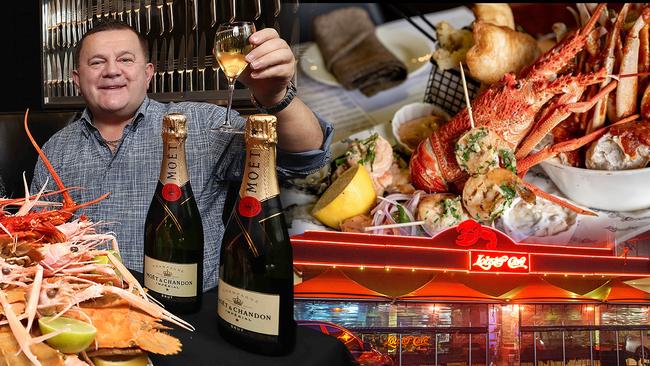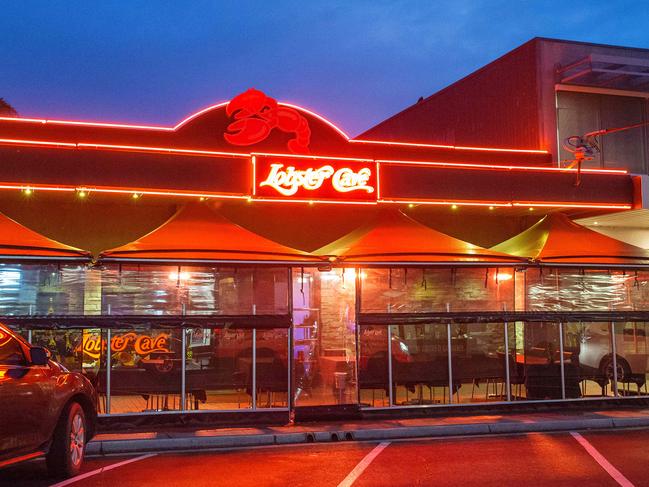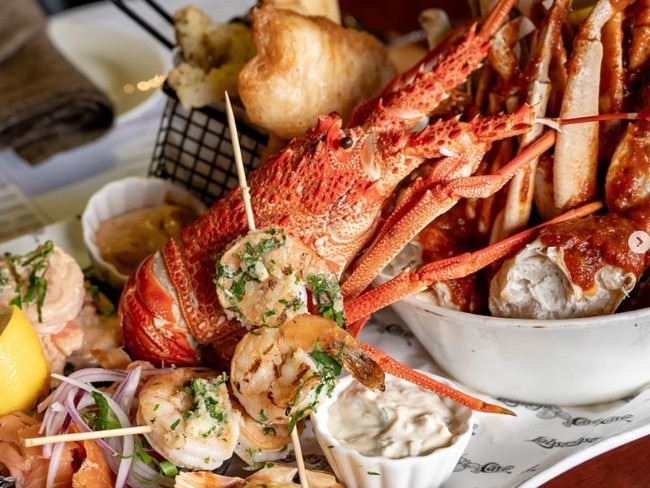Lobster Cave restaurant owner Bill Ferg probed for potentially trading while insolvent, making unreasonable payments
The owner of Melbourne’s famed Lobster Cave restaurant is caught up in the messy collapse of several of his food businesses, with liquidators suspecting he may have traded while insolvent and made unreasonable payments to associated businesses.

Victoria
Don't miss out on the headlines from Victoria. Followed categories will be added to My News.
The owner of Melbourne’s famed Lobster Cave restaurant is being investigated for potentially trading while insolvent and making unreasonable payments to associated businesses.
A disgruntled creditor of a failed business backed by Vasilios Fergadiotis is also considering funding its liquidator to carry out a “forensic investigation” into several food ventures linked to the hospitality veteran.
The revelations come as Mr Fergadiotis, better known as Bill Ferg, risks losing his high-profile Lobster Cave restaurant amid a $11m debt pile racked up by a string of his food businesses.
The restaurant made headlines in 2017 when then opposition leader Matthew Guy was spotted having dinner with an alleged Melbourne mafia boss in an incident dubbed “lobster with the mobster”.

A string of companies associated with Mr Fergadiotis have collapsed in recent months leaving creditor’s facing millions of dollars in losses.
Among them are food wholesaler Extramile Trading, which collapsed with debts of $8.6m in April.
Mr Fergadiotis is the company’s sole director.
Hamilton Murphy insolvency expert Stephen Dixon is overseeing the liquidation.
In a report to creditors lodged with the corporate regulator in August, Mr Dixon said Extramile possibly traded while insolvent and engaged in unreasonable director-related transactions.
Trading while insolvent means a company took on new debts when it knew it couldn’t pay them back.
Unreasonable director-related transactions take place when a company makes a payment or transfer to a director or close associate of a director for their benefit under circumstances where a reasonable person would not consider the transaction appropriate.
If the claims are ultimately proven it would mean Mr Fergadiotis would lose the legal protection a company structure offers and the liquidator could target his personal assets, such as any property he owned.

In terms of insolvent trading, Mr Dixon said the Braeside-based Extramile was “potentially insolvent” from January 1.
“My investigations with respect to verifying the date of insolvency and the quantum of the insolvent trading claim are still ongoing at this time,” he said.
“Once my investigations are completed, I will make a determination on the commerciality of pursuing an insolvent trading claim against the director.”
On the matter of unreasonable director-related transactions, Mr Dixon said he had identified several payments to suppliers that may potentially constitute preferential payments, as well as several payments to related entities that appear to be preferential in nature.
“The payments and offsets identified and provided to related entities may be classified as unreasonable-director related transactions and my investigations are ongoing in this regard,” he said.
Mr Dixon cautioned creditors that even if it was proved Extramile traded while insolvent, it would only be worth pursuing compensation from its director if he had sufficient personal assets.
He notes preliminary searches “have not identified any properties in the name of the director”.

In his report, Mr Dixon revealed he had been approached by an Extramile creditor about paying for a “forensic investigation” into its financial affairs, as well as two-other related companies.
“Should the creditor proceed with providing funding, they have requested an external forensic specialist to undertake these investigations and the outcome of their findings will be made available to me as the liquidator,” Mr Dixon said.
“These investigations will run parallel to investigations undertaken by me and my staff as part of the liquidation process.”
Mr Dixon notes Extramile blamed its collapse on the withdrawal of trade credit from a major supplier and the lingering effects of Covid.
The experienced liquidator said while he agreed with the reasons provided by Mr Fergadiotis and Extramile’s chief executive officer, he was also of the opinion the company collapsed because of “poor strategic management of the business”.
Other businesses backed by Mr Fergadiotis to have collapsed include dairy and vegetable products wholesaler Green Earth Industries which went bust with debts of more than $850,000 in April.
Another company, Lob Nominees, has been taken to court by non-bank lender and buy-now, pay-later service provider Humm Group.
Lob Nominees owns the business name Lobster Cave, as well as the restaurant’s website.
If Humm is successful in its court action, a liquidator will take control of Lob Nominees.
Both Hamilton Murphy and Mr Fergadiotis were contacted for comment.
Mr Fergadiotis has previously said: “We are limited in what we can say at this time because of litigation and negotiation matters, as we deal with the challenges”.
Originally published as Lobster Cave restaurant owner Bill Ferg probed for potentially trading while insolvent, making unreasonable payments




